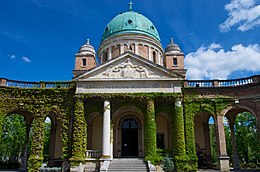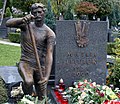Mirogoj Cemetery
| Mirogoj Cemetery | |
|---|---|
 Panoramic view of Mirogoj | |
 | |
| Details | |
| Established | 6 November 1876 |
| Location | |
| Country | Croatia |
| Coordinates | 45°50′06″N 15°59′10″E / 45.835°N 15.986°E |
| Type | Public |
| Owned by | City of Zagreb |
| Website | www |
| Find a Grave | Mirogoj Cemetery |
The Mirogoj City Cemetery (pronounced [mîrɔɡɔːj], Croatian: Gradsko groblje Mirogoj), also known as Mirogoj Cemetery (Croatian: Groblje Mirogoj), is a cemetery park that is considered[1] to be among the more noteworthy landmarks in the city of Zagreb. The cemetery inters members of all religious groups: Catholic, Orthodox, Muslim, Jewish, Protestant, Latter Day Saints; irreligious graves can all be found. In the arcades are the last resting places of many famous Croats.
History


The Mirogoj Cemetery was built on a plot of land owned by the linguist Ljudevit Gaj, purchased by the city in 1872, after his death.[2] Architect Hermann Bollé designed the main building. The new cemetery was inaugurated on 6 November 1876.[3]
The construction of the arcades, the cupolas, and the church in the entryway was begun in 1879. Due to lack of funding, work was finished only in 1929.[4]
Unlike the older cemeteries, which were church-owned, Mirogoj was owned by the city, and accepted burials from all religious backgrounds.[4]
On 22 March 2020, during the COVID-19 pandemic, Zagreb was hit by a 5.5 magnitude earthquake that caused significant damage across the city, including the damage on the famous arcades of the Mirogoj cemetery.[5]
Notable interments
- Zlatko Baloković (1895–1965), violinist
- Milan Bandić (1955–2021), longest-serving mayor of Zagreb[6]
- Ena Begović (1960–2000), actress
- Miroslav Blažević (1935–2023), football player and later manager[7]
- Hermann Bollé (1845–1926), architect[8]
- Ivana Brlić-Mažuranić (1874–1938), writer[9]
- Ferdinand Budicki (1871–1951), automotive and air travel pioneer of Zagreb, introduced cars to the city
- Krešimir Ćosić (1948–1995), basketball player and coach, member of both the Naismith Memorial Basketball Hall of Fame and FIBA Hall of Fame[10]
- Tošo Dabac (1907–1970), photographer
- Arsen Dedić (1938–2015), singer-songwriter and composer[11]
- Dimitrija Demeter (1811–1872), Greek–Croatian who played a major role in the movement for the national awakening of the Croatian nation
- Filip Deutsch (1828–1919), nobleman and industrialist
- Julio Deutsch (1859–1922), architect and co-owner of the architecture studio Hönigsberg & Deutsch
- Janko Drašković (1770–1856), nobleman, national reformer, politician and poet[4]
- Rajko Dujmić, songwriter and composer (1954–2020)[12]
- Hugo Ehrlich (1879–1936), architect
- Aleksandar Ehrmann (1879–1965), industrialist, philanthropist and diplomat
- Ljudevit Gaj (1809–1872), co-founder of the Illyrian movement[4]
- Leo Hönigsberg (1861–1911), architect and co-owner of the architecture studio Hönigsberg & Deutsch
- Hosea Jacobi (1841–1925), Chief Rabbi of Zagreb
- Miroslav Krleža (1893–1981), writer[13]
- Oton Kučera (1857–1931), astronomer
- Zinka Kunc-Milanov (1906–1989), famous soprano
- Svetozar Kurepa (1929–2010), mathematician
- Ante Kovačić (1854–1889), writer[14]
- Vatroslav Lisinski (1819–1854), composer[15]
- Vladko Maček (1879–1964), politician[16]
- Savić Marković Štedimlija (1906–1971), publicist
- Anđelka Martić (1924–2000), writer
- Antun Gustav Matoš (1873–1914), writer
- Andrija Mohorovičić (1857–1936), seismologist
- Edo Murtić (1921–2005), painter[17]
- Vladimir Nazor (1876–1949), writer[18]
- Maximilian Njegovan (1858–1930), Commander-in-chief and admiral of the Austro-Hungarian Navy[19]
- Slavoljub Eduard Penkala (1871–1922), inventor
- Dražen Petrović (1964–1993), basketball player, member of both the Naismith and FIBA Halls of Fame[20]
- Milka Planinc (1924–2010), first and only female prime minister of Yugoslavia
- Vladimir Prelog (1906–1998), Nobel prize-winning chemist[21]
- Petar Preradović (1818–1872), poet
- Stjepan Radić (1871–1928), leader of the Croatian Peasants Party[22]
- August Šenoa (1838–1881), writer[4]
- Ivica Šerfezi (1935–2004), singer and politician supporter of Croatian Peasant Party
- Ivan Šubašić (1892–1955), last Ban of Croatia
- Milka Ternina (1863–1941), famous soprano
- Franjo Tuđman (1922–1999), the first president of Croatia
- Vice Vukov (1936–2008), singer and politician[14]
- Tin Ujević (1891–1955), poet[23]
- Emil Uzelac (1867–1954), head of the Austro-Hungarian air force
- Ivan Zajc (1832–1914), composer[24]
Memorials
- Monument to Fallen Croatian Soldiers in World War I (1919)
- Monument to the children from the Kozara mountain
- Tomb of the People's Heroes (1968)
- Memorial Cross to Croatian Home Guard Soldiers (1993)
- Monument to the Victims of Bleiburg and the Way of the Cross (1994)
- German military cemetery (1996) for more than 4.430 deaths[25]
- Monument of the "Voice of Croatian Victims - Wall of Pain" (to Croatian victims of the Croatian War of Independence)
Location and access
It is located today in the Gornji Grad–Medveščak city district, on Mirogojska road and Hermann Bollé street.
ZET bus line 106 runs between the cemetery and the Kaptol bus terminal in the heart of Zagreb every 20 minutes during the cemetery's opening hours. A less frequent line, 203 (every 20–25 minutes), also starts from Kaptol by the same route, but continues further east to Svetice terminal, directly connecting to the Maksimir Park. Also, the line 226 goes by a similar route as the line 203, but goes through Remete. Also, it’s less frequent (every 35-40 minutes).
Gallery
- Monument to the 119 victims of fascist terror
- Antun Gustav Matoš's grave
- Andrija Hebrang's grave
- August Šenoa's grave monument
- Memorial to the Yugoslav death march of Nazi collaborators
- Bruno Bušić's grave
- Monument to dead, missing and detained Croatian soldiers
- Monument near Edo Murtić's grave
- Eugen Kumičić's grave
- Monument to the children from Kozara; about 400 children who died in Ustaše concentration camps during World War II
- Hermann Bollé's grave
- Ivo Kerdić's grave
- Matija Ljubek's grave
- Mirko Rački's grave
- Petar Preradović's grave
- Monument to the fallen Croatian soldiers in World War I
- Rudolf Perešin's grave
- Stjepan Radić's grave
- Monument to the July victims
- Dražen Petrović's grave
- Franjo Tuđman's grave
See also
References
- ^ "Beautiful cemetery worth a visit - Mirogoj Cemetery, Zagreb Traveller Reviews".
- ^ Švigir 2010, p. 10.
- ^ Švigir 2010, p. 12.
- ^ a b c d e Švigir 2010, cited in Polić 2011
- ^ Kiš, Patricia (24 March 2020). "FOTO: NADREALNI PRIZORI S MIROGOJA Potres je izazvao milijunsku štetu: ugrožene su čuvene Bolléove arkade, a crkvi Krista Kralja prijeti urušavanje". Jutarnji list (in Croatian). Retrieved 3 March 2021.
- ^ "Milan Bandić pokopan na Mirogoju: Ispraćen uz pjesmu Pod brajde, okupilo se jako puno ljudi. Emotivne govore održali Ljubo Jurčić i Jelena Pavičić Vukičević". Dnevnik.hr (in Croatian). 3 March 2021. Retrieved 3 March 2021.
- ^ "UŽIVO Oproštaj od Ćire: Evo tko će sve stajati uz lijes, u tijeku je komemoracija, stigle brojne legende". Gol.hr (in Croatian). 2023-02-15. Retrieved 2023-02-15.
- ^ Švigir 2010, p. 38.
- ^ Švigir 2010, p. 64.
- ^ Švigir 2010, p. 71.
- ^ "Arsen Dedić pokopan na Mirogoju". Slobodna Dalmacija (in Croatian). 25 August 2015. Retrieved 27 August 2020.
- ^ "Umro Rajko Dujmić: Legendarni glazbenik podlegao teškim ozljedama nakon nesreće". Jutarnji list (in Croatian). 4 August 2020. Retrieved 30 October 2020.
- ^ Švigir 2010, p. 34.
- ^ a b Švigir 2010, p. 60.
- ^ Švigir 2010, p. 27.
- ^ Švigir 2010, p. 35.
- ^ Švigir 2010, p. 78.
- ^ Švigir 2010, p. 81.
- ^ Maximilian Njegovan Archived 2011-07-18 at the Wayback Machine
- ^ Švigir 2010, p. 77.
- ^ Švigir 2010, p. 36.
- ^ Švigir 2010, p. 32.
- ^ Švigir 2010, p. 53.
- ^ Švigir 2010, p. 37.
- ^ kriegsgraeberstaetten.volksbund.de: click suchen, select 'Kroatien', click on Friedhof suchen and select Zagreb-Mirogoi
Further reading
- Polić, Maja (March 2011). "Mirogoj, Panteon hrvatske povijesti, Zagreb, 2010" (PDF). Rijeka (in Croatian). 16 (1): 89–90. Retrieved 13 February 2017.
- Švigir, Mihovil, ed. (2010). Mirogoj (PDF). Zagreb Tourist Board. ISBN 978-953-228-055-5. Retrieved 26 February 2017.
External links
- Official website
 (in Croatian)
(in Croatian) - Mirogoj Cemetery at Association of Significant Cemeteries in Europe























